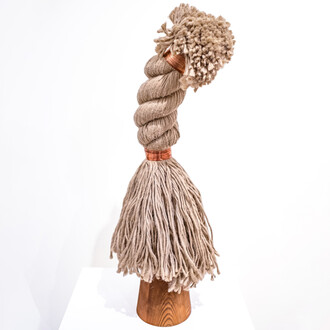u s e r u n f r i e n d l y is the first solo exhibition in the UK for Ubermorgen - the Swiss- Austrian-American duo founded in 1999 by lizvlx and Hans Bernhard. The exhibition features installations, videos, websites, actions, pixellated prints, digital-oil paintings and photographs in a hyper-active, super-enhanced exploration of censorship, surveillance, torture, democracy, e-commerce, and newspeak. The works seek to destabilise our understanding of the influence of technology, corporations and governments on our everyday lives and subvert the dominant networks of power that structure our world.
The exhibition includes two new installations - Do You Think That’s Funny? – The Edward Snowden Files (2013) and CCTV – A Parallel Universe (2013) – that continue Ubermorgen’s open-ended investigations into corporate and governmental authority; investigations that involve and implicate both the artists and the audience in a complex global network of power and influence. Perpetrator (2013) – a series of photographic and video works based on the life of Guantanamo Bay military guard Chris Arendt and his two month stay at the artists’ home in 2008 – and [V]ote-Auction (2000) – a platform that enabled trading of electoral votes in the presidential race between George W. Bush and Al Gore – broaden the scope of the artists’ research to consider the nature of and links between institutional and individual agency and responsibility.
Throughout the exhibition the infiltration and influence of the digital realm on the physical is further explored through paintings, prints and photographs. The Deephorizon (2010) series of digital-oil paintings (based on aerial images of the 2006 oil rig disaster in the Gulf of Mexico) reconsiders ‘oil painting’ as a live performance of process-based art form. Whilst the Psych|OS (2002 and 2012) series of photographs explores our relationship with mental illness, and complements the Oldify (2013) series of prints that utilise the Oldify™ app that takes an image and ages it: ‘It’s the perfect way to confront your own mortality during the springtime of your life.’
In a section of the exhibition, Aram Bartholl curates a selection of Ubermorgen’s Net.Art works on as series of wireless routers hung in the gallery. Each artwork is assigned a single Wi-Fi router, which is accessible through devices such as smart-phones, tablets or laptops. The content of the artwork is visible only on the visitor’s private screen.
Ubermorgen’s research-based practice is driven by a desire to satisfy their own curiosity, without the constraints of having a defined political agenda or preconceived beliefs: ‘If art and art production politicises itself, it becomes political and ceases to be art’2. Influenced by Dada and the Viennese Actionists, Ubermorgen’s ‘digital actionism’ utilises modern technologies and performance-based strategies to devise multilayered, flexible narratives that blend fact and fiction to draw both the artists and the audience in a real-time, ever-evolving high-stakes game.
The exhibition will be accompanied by a 32pp publication featuring an essay by curator Magda Tyżlik-Carver and conversations between Ubermorgen and Austrian quantum physicist Dr. Tobias Noebauer and between Ubermorgen and Edward Snowden.






![John Wood and Paul Harrison, Car/Lake, 2014, Single channel HD video [still], Courtesy of Carroll / Fletcher, Copyright © the Artists](http://media.meer.com/attachments/8c895f7e7c20da2c907139396cb1a9b1e42fbe09/store/fill/330/330/839b03cc952c7936ee75ee21e61db27eb94af33ffda825ab2937a6ede11a/John-Wood-and-Paul-Harrison-Car-slash-Lake-2014-Single-channel-HD-video-still-Courtesy-of.jpg)









